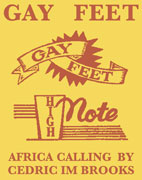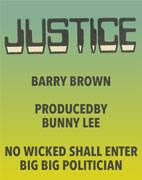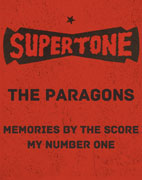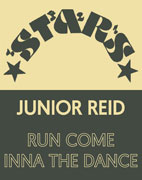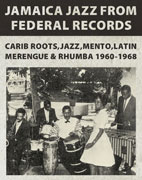Alva 'Reggie' LewisText by Harry Hawks
The history of Jamaican music is usually told, naturally enough, through the stories of the music's biggest stars but a whole host of less well known names also played a vital role in the development of the music; the guitar work of Alva 'Reggie' Lewis was an essential component in the nascent sound of reggae.
Alva 'Reggie' Lewis
| Real Name | Alva Lewis |
| Born | Apr 16, 1949 |
| Died | Feb 4, 2013 |
| Place of Birth | Manchester Jamaica |
| Related Artist(s) |
Alva Lewis' first recordings were rock steady vocals 'Suicide' for Phil Pratt, 'Return Home' recorded at Bunny Striker Lee's inaugural session and released on Ken Lack's Caltone label and 'I'm Indebted' for Derrick Morgan which was released in the UK on the Island label in 1967. The following year Alva enjoyed his first big hit along with keyboard player Glen Adams: the comical 'She' was also a very popular record in London; I remember when everyone in the dance used to shout out "sh*t" in the appropriate places!
Striker encouraged young Alva "who we called Reggie..." to follow a musical career and, on his first trip to London in 1968, he requested a set of instruments instead of cash for his young protégés from Dave Betteridge at Island Records and "Reggie got a Gibson guitar..."
In 1968 the rock steady beat speeded up into reggae and, like so many other firsts in Jamaican music, there are many contenders who claim to have made the first 'reggae' record including The Maytals with 'Do The Reggay' and Striker's brother Don Lee on 'It's Reggae Time'. But the style of music is perhaps more important than the name and Alva Lewis' pivotal role in the origination of the reggae rhythm is indisputable.
"Rock steady never had the organ shuffle. On a rock steady tune a horn man just played an intro, a solo and a little fill in. 'Bangarang' was the first reggae tune... it had the shuffle right through." Bunny Striker Lee
'Bangarang', a massive hit, was credited to Lester Sterling and Stranger Cole on Carifta and Lee’s in Jamaica and Pama's Unity label in the UK. The youthful band on the session included Lloyd Charmers and Glen Adams on keyboards and Alva Lewis on guitar whose relative inexperience was further proof of the Jamaican maxim "every spoil is a style".
"It was a foreign tune. A jazz tune named 'Bongo Chant' but the guys were young musicians and they couldn't hold the chords to the bridge. So I said to Lester Sterling 'make it into a two chord tune'..."
Bunny Striker Lee
The Hippy Boys came together soon afterwards and their mastery of the brand new reggae rhythm placed them in the position of Kingston's leading session band. The band comprised Aston 'Family Man' Barrett on bass, Carlton 'Carlie' Barrett on drums, Alva 'Reggie' Lewis on guitar and Lloyd 'Charmers' Tyrell and Glen Adams on keyboards. They occasionally featured Max Romeo on vocals. The band provided the musical backbone for countless hit records sometimes as The Hippy Boys, sometimes as The Upsetters, but more often than not without any credit at all. They provided the rhythm for Joe Gibbs(Joel Gibson) massive hit with The Pioneers 'Mama Look Deh' and Tony Scott's 'What Am I To Do Now' originally released on the Estick Records label. The rhythm for 'What Am I To Do Now' was, in turn, used by Harry J(Harry Johnson) for Winston Wright's 'Liquidator' a UK National Chart hit in 1969 which reached the Number Nine position and stayed on the charts for twenty weeks. The Hippy Boys also enjoyed their own instrumental hits for Sonia Pottinger's High Note label including 'Dr No Go' whose title was taken from a series of cartoon adverts in Jamaica's Daily Gleaner newspaper where the evil exploits of 'Dr No Go' were foiled by putting Esso Extra's 'Tiger in your tank'. 'Reggae Pressure' was another big hit in the UK and their High Note album 'Reggae With The Hippy Boys' proved popular in both Jamaica and the UK and has since become a sought after highly priced and highly prized collectors item.
Val Bennett blew a saxophone version entitled 'Return Of Django' over a rhythm that The Hippy Boys had built for Lee 'Scratch' Perry(Lee Perry), a version to Chris Kenner's 'Sick And Tired', which reached the giddy heights of Number Five in the UK National Charts towards the end of 1969. Scratch assembled a band for a UK tour in November of that year that included Carlie, Family Man, Glen Adams and Alva Lewis but not Val Bennett and instead enlisted "a horn player in England named Kirk to play his part" .The Hippy Boys were to all intents and purposes now The Upsetters.
"In fact The Hippy Boys were The Upsetters while being produced by Lee Perry and The Hippy Boys while being produced by Sonia Pottinger"
On their return to Kingston in early 1970 Scratch began recording with Bob Marley & The Wailers and encouraged them to emphasise the 'blacker' elements in their music and song writing. Ironically it was by ignoring the more obvious trappings of commercialism on records such as 'Duppy Conqueror', 'Small Axe' and 'Who Is Mr Brown' that The Wailers laid a solid foundation that enabled the group to become reggae's single most commercial entity and Jamaica's first global stars. Many years later Bunny Wailer recalled just how important The Upsetters were to The Wailers breakthrough.
"Well... make I tell you now. Family Man, Carlie Barrett, Reggie, Glen Adams they are The Upsetters. We began our real establishment internationally with these brothers playing the music." Bunny Wailer
The Wailers parted company with Scratch in 1971 taking the drum and bass, Aston and Carlton Barrett, of the Upsetter rhythm section with them but Alva stayed with Scratch. As well as occasionally releasing solo records including 'Ethiopian Land' and 'Natty Natty' on Scratch's Black Art and Upsetter labels he also played for other producers on hit records including Lloyd 'Matador' Daley on Alton Ellis' 'Deliver Us' and Phil Pratt on Ken Boothe's 'Artibella'. But Alva sadly now gradually began to drift away from music making.
In 1981 Ken Khouri sold his Federal Records studio and pressing plant to Rita Marley's Tuff Gong International organisation. Rita "gave Alva Lewis permanent employment as a gate man at Tuff Gong" but, following a long illness, Alva 'Reggie' Lewis died at his St. Andrew home on 4th February 2013 aged 63.
Sources:
Naoki Ienaga: Interview with Bunny Wailer Kingston, Jamaica 19th October 2012
Noel Hawks & Jah Floyd: Reggae Going International 1967 to 1976 The Bunny 'Striker' Lee Story
Jamaican Recordings Publishing 2012
David Katz Solid Foundation An Oral History Of Reggae Bloomsbury Publishing Plc 2003
Date Added: Jun 26, 2013 / Date Updated: Oct 20, 2014
Copyright (C) 2024 Dub Store Sound Inc.











